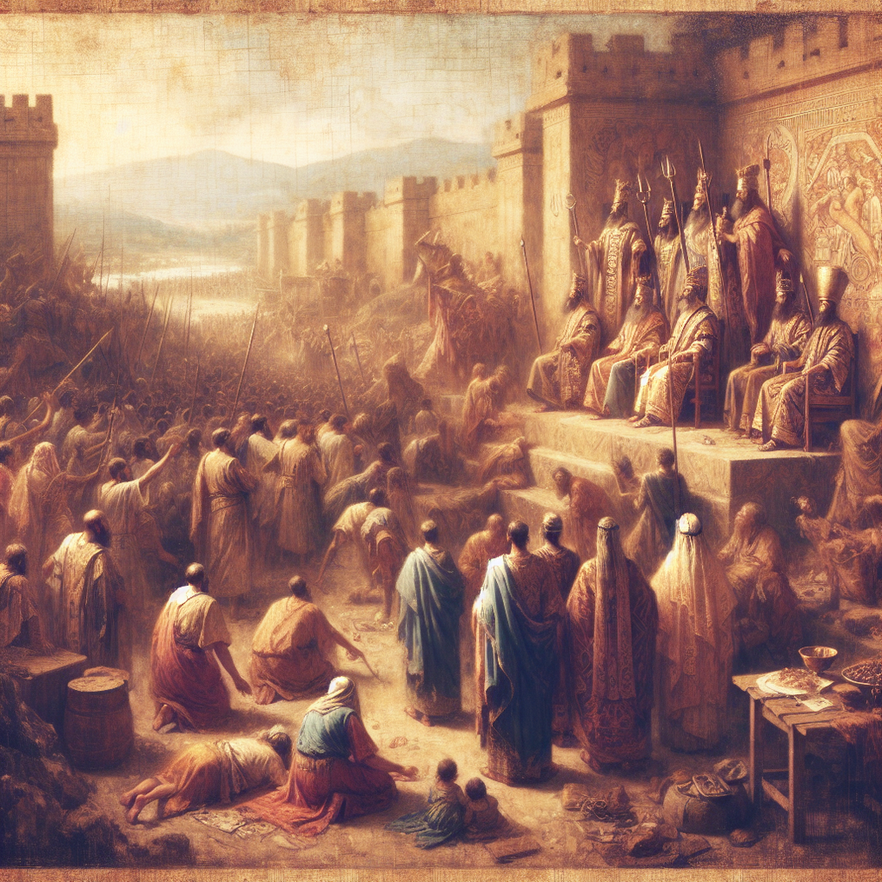2 Chronicles 28: Lessons from Ahaz's Evil Reign

2 Chronicles 28
Key Verses
- 2 Chronicles 28:1-4: These verses describe King Ahaz's idolatry, highlighting his unfaithfulness to God by engaging in pagan practices, including child sacrifice.
- 2 Chronicles 28:5-8: This passage details the military defeats suffered by Judah at the hands of Syria and Israel, resulting in significant loss of life and the capture of many people.
- 2 Chronicles 28:9-15: In these verses, the prophet Oded intervenes, urging the Israelites to release the captives from Judah, which they do, showing mercy and compassion.
- 2 Chronicles 28:16-21: Ahaz's distress is compounded by attacks from the Edomites and Philistines, and his futile appeal to Assyria for help.
- 2 Chronicles 28:22-25: Despite his troubles, Ahaz continues in his idolatry, closing the temple and erecting altars to foreign gods.
- 2 Chronicles 28:26-27: The chapter concludes with the death and burial of Ahaz, noting his exclusion from the royal tombs due to his unfaithfulness.
Themes
- Idolatry and Consequences: The chapter underscores the severe consequences of idolatry, as Ahaz's unfaithfulness leads to national disaster and personal ruin.
- God's Judgment and Mercy: While God's judgment is evident in the military defeats, His mercy is shown through the prophet Oded's intervention, which leads to the release of captives.
- Leadership and Accountability: Ahaz's reign exemplifies the impact of a leader's actions on their nation, emphasizing the importance of righteous leadership.
Historical Context
- Time Period: Ahaz reigned from approximately 735 to 715 BCE, a time marked by political instability and military threats.
- Political Climate: Judah faced threats from neighboring nations, including Syria and Israel, leading to military defeats and loss of territory.
- Significant Events: The chapter records Judah's defeat by Syria and Israel, the intervention of the prophet Oded, and Ahaz's unsuccessful appeal to Assyria for help.
Cultural Context
- Idolatry and Pagan Practices: The cultural context of the time was heavily influenced by surrounding pagan nations, leading Ahaz to adopt their idolatrous practices.
- Social Structures: The king held significant power, and his actions had far-reaching effects on the religious and social life of Judah.
Etymology
- Hebrew Word "Darash": The word "darash" (דָּרַשׁ) means "to seek" or "to inquire," emphasizing the importance of seeking God's will and guidance, which Ahaz failed to do.
Put it into Practice
- Faithfulness in Leadership: Leaders should strive to follow God's will, understanding the impact of their actions on those they lead.
- Seeking God's Guidance: Individuals should actively seek God's guidance in their decisions and daily lives.
- Mercy and Compassion: Like the Israelites who released the captives, we should show mercy and compassion to those in need.
Questions
- How does understanding the consequences of idolatry influence your spiritual practices and priorities?
- What steps can you take to seek God's guidance more intentionally in your daily life?
- How can you demonstrate mercy and compassion to those around you, reflecting the intervention of the prophet Oded?
Reflecting on these questions can lead to personal growth and a deeper understanding of the text, encouraging a more faithful and compassionate life.